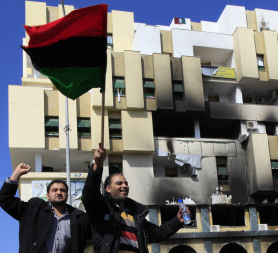Libya: international pressure on Gaddafi mounting
As Colonel Gaddafi faces increasing international pressure to step down, Jonathan Rugman writes from Zawiyah, near Tripoli, of the “miracle, but terrible cost” of the revolution in Libya so far.

Leaders across the globe have urged Gaddafi to stand down in the face of violent protests and pitched battles across Libya‘s cities and towns which have claimed at least 1,000 lives.
The unrest entered its third week on Monday. Rebels shot down a military aircraft near Libya’s third city, Misrata, as the international community scrabbled for options to unseat Gaddafi and end the violence.
Anti-Government protesters have won over large parts of the military, control the east of the country including the city Benghazi, and are now battling pro-Gaddafi forces in major cities like Misrata.
There is no future for Libya that includes him [Gaddafi]. Prime Minister David Cameron
Amid reports of the army opening fire on protesters and other potential human rights abuses as Gaddafi clings onto power, the United Nations has imposed sanctions, asset freezes, and a travel ban on the leader.
The UN also voted to refer the regime to the International Criminal Court as the violence and fighting in the country continued.
Prime Minister David Cameron said: “All of this sends a clear message to this regime: it is time for Colonel Gaddafi to go and to go now. There is no future for Libya that includes him.”
William Hague added his voice to the condemnation today, warning that international law would bring a “day of reckoning” to those guilty of human rights abuses in Libya.
Could Gaddafi use chemical weapons? Channel 4 News investigates
US Secretary of State Hillary Clinton echoed calls for Gaddafi to go, saying the US was reaching out to rebels in the east.
But Gaddafi remained defiant on Sunday, telling Serbian television: “The people of Libya support me. Small groups of rebels are surrounded and will be dealt with.”
In an interview with The Times newspaper, former prime minister Tony Blair said he had made a “personal plea” to Gaddafi to step down, which had also been ignored by the leader, who he said was “in denial”.
Follow the latest events on our live blog
Violence
The condemnation and sanctions come as fighting continues in Libya.
The anti-Gaddafi groups are holding the town centres of Zawiyah, 20 miles west of Tripoli, and the city of Misrata, 125 miles east. A witness in Misrata said: “An aircraft was shot down this morning while it was firing on the local radio station. Protesters captured its crew.
“Fighting to control the military air base started last night and is still going on. Gaddafi’s forces control only a small part of the base. Protesters control a large part of this base where there is ammunition.”
Saif Gaddafi: 'I will send weapons'
Colonel Gaddafi's son Saif has been caught on video rallying his supporters to take on the protesters, while brandishing a gun and promising them weapons.
"So today go and show them that the armed forces are with Libya. Iwill tell you something. You will get the support - all the means, weapons and money. Everything is fine. We will win!"
Read more - Saif Gaddafi vows 'I will send you weapons' in Libya video
Residents even in parts of the capital Tripoli have thrown up barricades against Government forces. A General in the east of the country, where Gaddafi’s power has evaporated, said they were ready to help protesters in Tripoli.
“Our brothers in Tripoli say: ‘We are fine so far, we do not need help’. If they ask for help we are ready to move,” said General Ahmed el-Gatrani, one of most senior figures in the mutinous army in Benghazi. Opposition forces are largely in control of Libya’s oil facilities, which are mostly located in the east, and output has been reduced to a trickle.
The evacuation of British citizens also continues, with a further 150 people evacuated by the RAF on Sunday. Many other wealthy nations are now close to evacuating all of their citizens from Libya – although human rights agencies warned that citizens from poorer nations could be stranded, and up to 100,000 have fled the violence in a growing refugee crisis.
Libya: liberation, at a terrible cost
The town of Zawiyah, just 30 miles west of Tripoli, is marvelling at the miracle of its own liberation, writes Channel 4 News Foreign Affairs Correspondent Jonathan Rugman, in Libya.
In the town square yesterday, thousands of people were chanting “Down, Down with the Gaddafi regime!” – the same chant which has helped topple dictatorships in neighbouring Tunisia and Egypt. Posters of Libya's leader have been torn down, the police station is a smouldering wreck, and copies of Gaddafi’s infamous “Green Book” – his manifesto for 41 years of dictatorship – lie torn and abandoned amid the debris of several days of ferocious fighting.
Zawiyah's square is ringed by tanks and anti-aircraft batteries, manned by soldiers who defected after refusing to shoot their own people dead. But freedom here has come at terrible cost, with a doctor telling me more than 30 people have been killed by Gaddafi’s forces since anti-Government protests intensified last Thursday.
"I saw 24 of them myself,” Dr Yusuf Mustafa said. "They were killed by bullets in the head, chest and neck, some by heavy guns for shooting aircraft."
Read more from Jonathan Rugman on Libya: liberation, at a terrible cost and follow him on Twitter @jrug